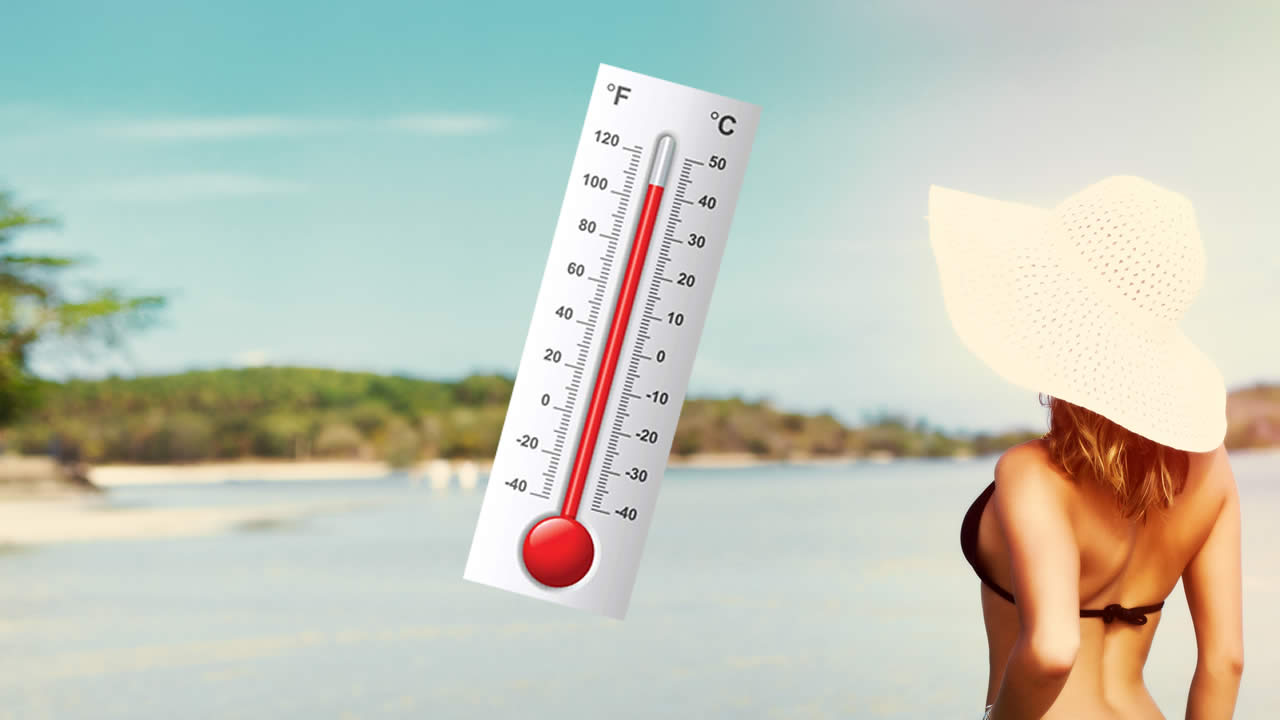Hot summer season : cautionary measures to tackle the heat
 Par
Nafissah Fakun
Par
Nafissah Fakun
 Par
Nafissah Fakun
Par
Nafissah Fakun

Since December last, we have been experiencing a wave of heat across the island. The high temperatures and humid weather conditions are making people, especially the most vulnerable such as infants and the elderly, feeling uneasy. How long should we expect such conditions? What cautionary measures should be taken so that we could live through the summer with serenity? News on Sunday talked to some of the major stakeholders so as to ascertain this uncomfortable weather.
“Oh my God! It’s so hot! It’s hot! It’s hot.” Everywhere we go, people across the island are complaining about the hot weather. Indeed, since December last, Mauritius has recorded high temperatures and a high humidity level. However, the fact is we are in the peak summer season and such weather conditions are to be expected.

According to the Mauritius Meteorological Services, temperatures above the normal were expected during this summer season. “We have indicated in our Summer Outlook 2018-2019 that temperatures will be high and this is what we have been experiencing since the past month. We should bear in mind that we are in the peak summer season. We expect that on certain days, temperatures will exceed the monthly average by more than two degrees Celsius in some locations,” they explain.
Indeed, as indicated in the Summer Outlook 2018-2019 of the Mauritius Meteorological Services, the frequency of extreme weather and climate events has increased in the Southwest of the Indian Ocean. “The latest findings of the Special Report on Global Warming of 1.5oC (SR15), above pre-industrial level confirmed the above observations. As such, it is very likely that similar events in the form of heavy/torrential rainfall leading to flash floods and violent thunderstorm, and explosive intensification of cyclones may occur during the forthcoming summer 2018-2019,” underlined the report.

For the Mauritius Meteorological Services, the reasons why we are feeling such heat is because there is a very moderate and rather warm airstream flowing over our region and there are the prolonged periods of high humidity. In addition, we have long hours of sunshine and thus we feel the heat more.” What is the highest temperature we can expect during this season? “Maximum day temperatures may reach 36oC at Port Louis and along the Western coast. This warm condition will persist during the months of January to March,” explains the Mauritius Meteorological Services.
However, the Mauritius Meteorological Services adds that there are certain days where the temperature might become milder. Why so? “Windy conditions temporarily attenuate the hot weather. Moreover, due to cloudiness at times, there are less hours of sunshine and thus we do not feel the heat. This is why we may feel less hot on certain summer days.”
As we know, the summer season is also the cyclone season. What should we expect in terms of storms? “The cyclone basin in the South West Indian Ocean is in a calm phase for now. However, we are expecting that by the end of January, cyclonic activity may start,” informs the Mauritius Meteorological Services.
 Summer is the holiday season in our island, the perfect time to spend family time outside, at the beach, strolling and having fun under the sun. However, summer is not without its risks. Indeed, the torrid conditions certainly lead to discomfort and in many cases, severe discomfort, especially to the vulnerable groups of the population. General practitioner Dr Bassoodev Goolaub explains that people should take certain cautionary measures during summer time.
Summer is the holiday season in our island, the perfect time to spend family time outside, at the beach, strolling and having fun under the sun. However, summer is not without its risks. Indeed, the torrid conditions certainly lead to discomfort and in many cases, severe discomfort, especially to the vulnerable groups of the population. General practitioner Dr Bassoodev Goolaub explains that people should take certain cautionary measures during summer time.
“The first precaution is not to go out when the sun is at its peak. That is, we should avoid going out between 12:00 and 16:00. The hours before noon and after 16:00 are the safest and most effective way not to suffer from sunburn and dehydration,” he says. In addition, the doctor advises that those who wish to tan during summer must be very cautious.
“UV rays are dangerous for the skin. Those who want to tan when going to the beach have to be very careful. It is not advised to expose yourself under the sun if you do not protect your skin. In order not to suffer from sunburn, you have to wear a sunscreen lotion according to your skin type. In cases where the damage is done, use remedial creams that will help you heal your skin.” Dr Bassoodev Goolaub adds that these people may also suffer from dehydration. “We advise people to carry a bottle of water with them at all times wherever they go; whether they are in the car, at the beach, on the streets, and they need to drink often in order not to suffer from dehydration.”
For the elderly, Dr Goolaub advises salted water to hydrate themselves. “The elderly does not like to drink water as they should because they will have to use the toilet often. They can avoid this by drinking water in small quantity but often, like every 30 to 45 minutes. Also, it is advisable for them to add some salt to their drinking water. This will help to rehydrate their body and skin better.”
For the infants, Dr Goolaub advises parents to make sure to give water often to their infants. “Babies and infants are very vulnerable to the heat and dehydration is dangerous for them. Parents should make sure to provide water every 20 to 30 minutes, give a warm bath or shower at least twice a day, to dress them in light clothes. For the breastfed baby, give breast milk more often and for the bottle-fed baby, offer water between drinks.” He emphasises that parents should never leave a child or baby alone in a car or a poorly ventilated room, even for a few minutes.
For those who are sick, who have fever and suffer from infection, Dr Goolaub highlights that their best medication during summer is water. “They should keep a bottle of water near them at all times and drink often, too.” For the general public, Dr Goolaub advises to drink water regularly without waiting to feel thirsty; refresh oneself and wet the body (at least the face and forearms) several times a day; avoid drinking alcohol; avoid going out at the hottest hours and spend several hours a day in a cool place and avoid physical efforts.
He underlines that there are important signs to watch among the vulnerable group such as less urine and dark urine; dry skin, lips or mouth; headache, vomiting or diarrhea; abnormal color of the skin, pale or red; hollow and ringed eyes; elevated body temperature, 38.5°C and above (rectal); unusual agitation, irritability or confusion; difficulty breathing, sleepy, sleep a lot and difficult to wake up. “These signs indicate that the person is suffering from dehydration and should be given immediate care.”


 Dietician at Wellkin Hospital, Amiirah Hosenbux explains that fatigue, attention deficit, headache, migraines, nausea are common complaints that accompany the summer season. “Easy dehydration during hot weather leads to such conditions of discomfort due to the inability to replace fluid lost through sweating. Sweating is a normal biological need that helps in maintaining constant body temperatures even in hot weathers. However, it is in parallel essential to maintain the constant fluid milieu of the body for biological processes to take place.” She reveals that during this season, many people misinterpret between thirst and hunger. “Some time people feel thirsty but they misconstrue it as hunger and eat more regularly and most of the time, it is junk food, high in calorie and energy.
Dietician at Wellkin Hospital, Amiirah Hosenbux explains that fatigue, attention deficit, headache, migraines, nausea are common complaints that accompany the summer season. “Easy dehydration during hot weather leads to such conditions of discomfort due to the inability to replace fluid lost through sweating. Sweating is a normal biological need that helps in maintaining constant body temperatures even in hot weathers. However, it is in parallel essential to maintain the constant fluid milieu of the body for biological processes to take place.” She reveals that during this season, many people misinterpret between thirst and hunger. “Some time people feel thirsty but they misconstrue it as hunger and eat more regularly and most of the time, it is junk food, high in calorie and energy.
Starchy foods, rice, cereals, potatoes in moderate quantities depend on the activities of each person, just like proteins: Meat, eggs, fish, dry grain, milk are to be maintained, she says. Additionally, the dietician recommends everyone to eat fruits and vegetables every day to ensure an adequate intake of mineral salts. “Water and vitamins that are lost when one is dehydrated (through urine and sweat) must be replaced. In contrast, cakes and other creams, mayonnaise or milk dishes that are exposed to ambient temperature should be avoided for food poisoning. Excess salt can also be the cause of dehydration. So, limit commercial sauces that are flavour enhancer.”
Due to high temperature, many people tend to drink an excess of liquids, in terms of water or juice. To this, Amiirah Hosenbux indicates that water is highly recommended for each and everyone without any restriction. She advises for eight glasses of water but this also depends on the size of an individual. She also recommends smoothies for non-diabetics. “The activities of the day are the atmospheric temperature will dictate the additional water needs to replace it in order to avoid common symptoms like headache, fatigue, nausea or lack of concentration.”
Furthermore, concerning the consumption of fruits and vegetables, she states that all fruits and vegetables are full of benefits. “Diabetics can consume all fruits in moderation. The time they are eaten, the menu combinations at each meal, the portions of rice, the modified bread and a good sport activity in parallel can help maintain a good blood sugar level. For example: eat the fruits in the morning, substitute two slices of mango for half of bread, 4 spoon of cooked rice, eat a lot of raw vegetables, salads and walk for at least 30 mins every day.”
 J'aime
J'aime